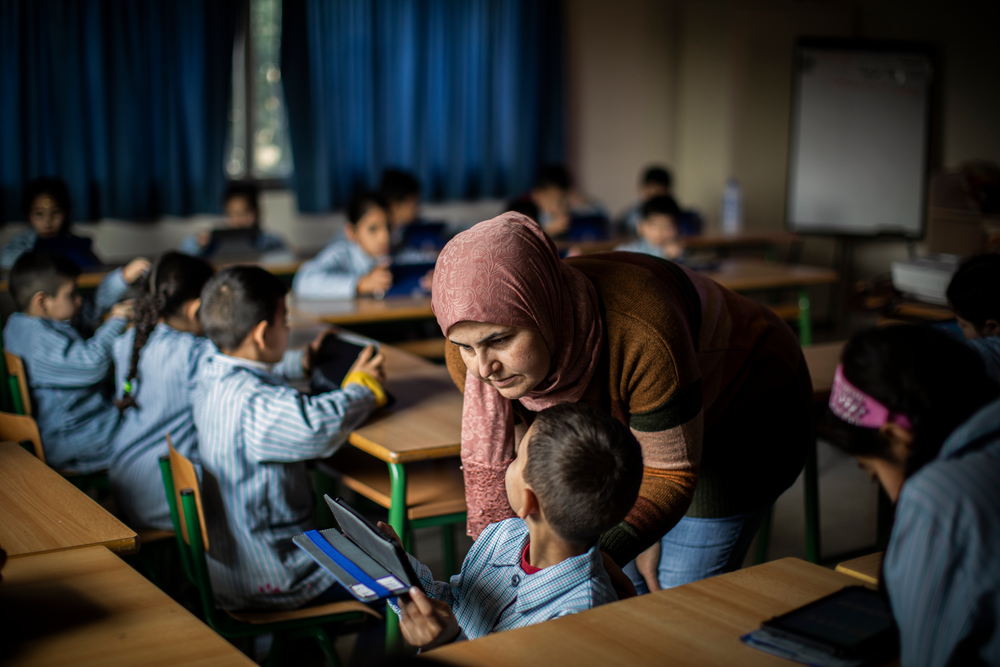
Five things you need to know this week about global education

Child marriage, Education funding, Refugees and internally displaced people
A warning that Lebanon's education system is on the brink of a crisis that will keep children out of school for a third year- plus how some girls are still going to secondary school in Afghanistan.
Lebanon school system ‘at a tipping point’
The education system in Lebanon is on the brink of a crisis that could see hundreds of thousands of children miss out on schooling for another year, major organisations have warned.
A combination of the economic situation, the Beirut explosion, political challenges and the pandemic have shut many schools for prolonged periods since October 2019, affecting more than 1.3 million children and keeping over 700,000 children out of school.
Almost 42,000 children dropped out of school last year and the UN and World Bank predict that more children will be more will be lost from the education system this year.
The Lebanon Education Cluster – which brings together NGOs, United Nations agencies and local partners – warned: “The situation is now at a tipping point: urgent action must be taken to ensure that all children in Lebanon can safely return to school and have opportunities to learn.” It called for donors to support education ministry plans to reopen schools said the government needs to increase spending on education.
Human Rights Watch also urged international donors to channel more aid directly to schools, teachers and students’ families.
Aya Majzoub, Lebanon researcher at Human Rights Watch, said: “There needs to be an all-hands-on-deck response from the government, donors and the UN to avert a disaster for children and the country.”
Theirworld has been working in Lebanon to expand access to education through research, advocacy and campaigning. This year that includes a Theirworld-supported video project to help children with special educational needs learn from home during the pandemic and the launch of the MyBestStart project to help thousands of vulnerable Lebanese and refugee children access quality early childhood education.
Theirworld chief highlights missing $75bn
Theirworld President Justin van Fleet featured in online roundtable of experts who were asked about the prospects and priorities for education funding in low-income countries.
He said: “We are ignoring the elephant in the room, which is that we still need at least $75 billion a year to fund education. We are currently marshalling $15 billion from the international community, so there is a big gap to fill.”
The Education Finance Playbook – produced by Theirworld earlier this year – warned about the shortfall of $75 billion a year that is needed to meet the United Nations’ goal of quality education for every child by 2030.
The experts were asked for their views by the Financial Times.
Some Afghan girls still go to high school
While girls across most of Afghanistan remain at home as their brothers go to high school, classes in some northern areas have been open for all students – highlighting regional differences emerging two months after the Taliban seized power.
Secondary schools remain closed for girls in much of the country. But in Mazar-i-Sharif, close to the border with Uzbekistan, local authorities have taken a different approach.
Zabihullah Noorani, head of the culture and information directorate in the northern province of Balkh, said: “Here, there is no obstacle or barrier for girls’ education.”
One 15-year-old in the 10th grade told Reuters news agency she had been going to school without interruption, despite strict clothing requirements imposed by the Taliban. She added: “These restrictions have made some girls lose interest but still we girls are happy that at least we are going to school.”
School health initiative to help 2.6bn children
Health and education ministers from South-East Asian countries have committed to scaling up school programmes that promote the health, nutrition and wellbeing of children and adolescents.
The Health Promoting Schools initiative will serve hundreds of millions of school-age children and adolescents in the region, which is home to more than a quarter of the world’s population and includes India, Bangladesh, Indonesia and Thailand.
Government ministers and heads of UN agencies committed to keep schools open during public health emergencies and to be resilient and well prepared for future emergencies.
“The pandemic is a strong reminder of the importance of maintaining strong education systems that support the interlinked objectives of education and health for all children and adolescents leaving no one behind,” said Dr Poonam Khetrapal Singh, Regional Director of the World Health Organization South-East Asia.
Faith leaders work to end child marriage
A group of imams has been championing efforts to end child marriage and keep girls in school in Zanzibar, off the coast of Tanzania.
“About six of my students between the ages of 15 to 17 dropped out of school in less than five months,” said their leader, Sheikh Is-haka Vuai. “They not only lost the opportunity to get a religious education but also lost the opportunity to build their future through school education, which was cut short because of the marriage.”
In Zanzibar, 18% of girls are married before age 18. Faith leaders have been working with the United Nations Population Fund (UNFPA) for two years to change attitudes.
To bolster these efforts, a three-year programme has been launched by UNFPAwith funding from Finland. Many of the activities will be driven by young women and girls themselves, including those with disabilities.
More news

